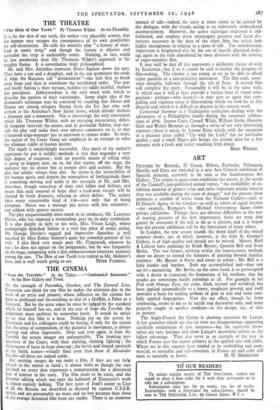THE THEATRE
"The Skin 'of Our Teeth." By Thornton Wilder. At the Piccadilly.
Ir is by the skin of our teeth, the author very plausibly asserts, that the human race escapes the consequences of its own proclivities for self-destruction. He calls his morality play " a history of man- kind in comic strip," and though the history is allusive and surrealist the strip is undeniably comic. Nothing, in fact, could be less ponderous than Mr. Thornton Wilder's approach to his weighty theme. It is nevertheless truly philosophical. Mr. and Mrs. Antrobus represent Homo Sapiens down the ages. They have a son and a daughter, and in the son germinate the seeds of what the Russians call " deviationism "—the itch first to break away from and then to overthrow the established order. The pert and lovely Sabina is their servant, feckless yet oddly faithful, shallow but percipient. Jabberwockian is the only word with which to describe the pattern of their vicissitudes. Some slight idea of the dramatist's technique may be conveyed by recalling that Moses and Homer are among refugees fleeing from the Ice Age who seek asylum in the Antrobus's New Jersey home, which already shelters a dinosaur and a mammoth. Nor is chronology the only convention which Mr. Thornton Wilder, with an engaging insouciance, defies. At frequent intervals the actors, and in particular Sabina, step out- side the play and make their own adverse comments on it, so that a harassed stage-manager has to intervene to restore order. In short, the tactics of the Crazy Gang are employed in an attempt to solve the ultimate riddle of human destiny.
The result is astonishingly successful. One merit of the author's capricious (to put it mildly) methods is that they engender a very high degree of suspense ; with no possible means of telling what is going to happen next on or, for that matter, off the stage, the audience has no choice but to remain alert and curious. But the play has solider virtues than this. Its theme is the invincibility of the human spirit, and despite the atmosphere of harlequinade there is something moving and noble in the spectacle of Mr. and Mrs. Antrobus, though conscious of their own follies and failings, and aware that each renewal of hope after a hard-won victory will be cheated by fresh disasters, refusing to admit defeat. The author takes every conceivable kind of risk—save only that of being pompous. Never was a message put across with less solemnity : and seldom with greater success.
The play unquestionably owes much to its producer, Mr. Laurence Olivier, who has imposed a tremendous pace on its zany symbolism. It is also deeply in debt to his wife, Miss Vivien Leigh, whose enchantingly detached Sabina is a very fine piece of comic acting. Mr. George Devine's rugged and impressive Antrobus is well matched by Miss Esther Somers's quiet but powerful portrait of his wife. I also liked very much poor Mr. Fitzpatrick, whoever he was ; he does not appear on the programme, but he was frequently on the stage, composing with a dire embarrassment recurrent mutinies among the cast. The Skin of our Teeth is as topical as Mr. Molotov's
liver, and is well worth going to see. PETER FLEMING.


























 Previous page
Previous page